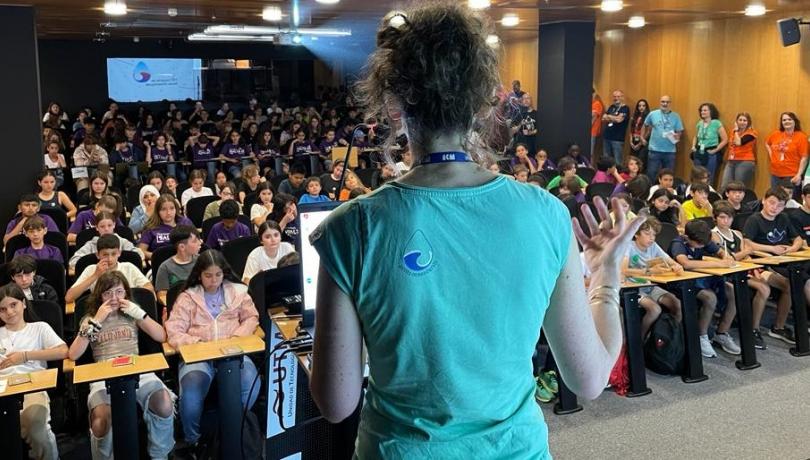The project seeks to bring the ocean into the classrooms and raise awareness among the youngest of the need to protect this ecosystem.

More than 150 students have participated in the VII congress of the Little Oceanographers project, an initiative of the Institut de Ciències del Mar (ICM-CSIC) that aims to introduce oceanography to the youngest. Since 2016, about 200 students in fifth and sixth grade of primary school participate each year in this educational project.
The congress, held at the ICM-CSIC headquarters, is the culminating moment of the course, and allows the Little Oceanographers to present their research work in different formats to their classmates from other schools, as well as to the Institute's technical and research staff.
"It is very exciting to see how the students delve into the world of marine sciences with enthusiasm and curiosity. They always amaze us when exhibiting the results of their work. This year, for example, one group presented a project that mixed science and music by playing sounds from the sea", explains the ICM-CSIC oceanographer and project coordinator Carine Simon.
Bringing the sea closer to students
Small Oceanographers seeks to bring the ocean to all types of schools from a double perspective: on the one hand, bringing the ocean to the classroom and, on the other, bringing the classroom to the ocean. This creates a strong bond with the students and provides tools for teachers to teach marine sciences in a comprehensive way both in the classroom and through experiments on the beach.
To this end, several sessions are held during the course. The first ones take place in the classroom, where the researchers pose questions and workshops on the scientific method and ocean dynamics, among others, to the students.
Subsequently, the experts take the students to the field to conduct various experiments. The idea is that, based on these experiences, the children will be able to design their own scientific projects and answer the questions posed at the beginning of the course.
Another of the project's activities is the live monitoring of the oceanographic campaigns in which the ICM-CSIC participates through online sessions and diaries written by the researchers themselves while they are on board.
During the Antarctic summer 2023, the POLAR CHANGE project went to study the interactions between the ocean, ice and atmosphere in the context of global change in the Antarctic aboard the oceanographic ship Hesperides, and launched the outreach project " HEADING TO THE ANTARCTICA: 5 WEEKS, 5 CHALLENGES" which has allowed a large number of schools and institutes to navigate the Antarctic Ocean through the ICM Divulga website.
Finally, thanks to a collaboration with the Maritime Museum of Barcelona, the students participate each year in a one-day oceanographic campaign aboard the historic ship Santa Eulàlia.
"It is very enriching to see the involvement of everyone, both teachers and students and the group of volunteers from the Institute, which encourages us to repeat the project year after year," says Eva Flo, another ICM-CSIC researcher involved in the project.